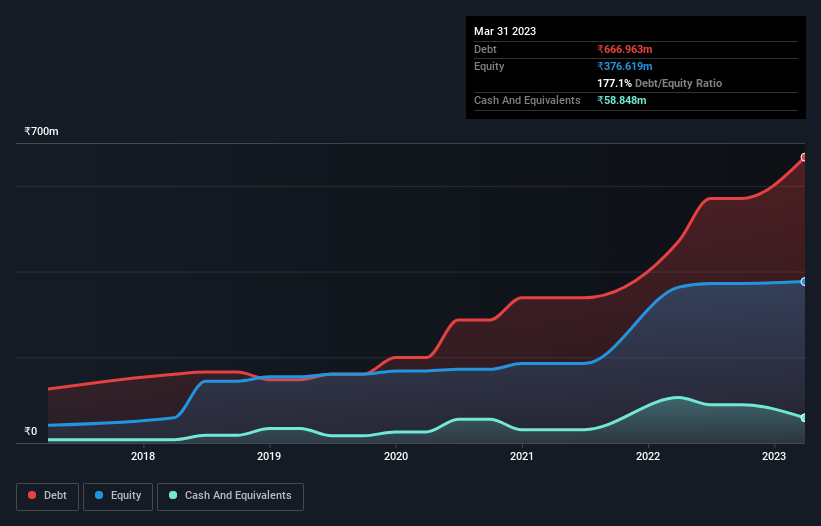Is Ambani Organics (NSE:AMBANIORG) Using Too Much Debt?

Warren Buffett famously said, 'Volatility is far from synonymous with risk.' So it seems the smart money knows that debt - which is usually involved in bankruptcies - is a very important factor, when you assess how risky a company is. We note that Ambani Organics Limited (NSE:AMBANIORG) does have debt on its balance sheet. But the more important question is: how much risk is that debt creating?
What Risk Does Debt Bring?
Debt and other liabilities become risky for a business when it cannot easily fulfill those obligations, either with free cash flow or by raising capital at an attractive price. If things get really bad, the lenders can take control of the business. However, a more frequent (but still costly) occurrence is where a company must issue shares at bargain-basement prices, permanently diluting shareholders, just to shore up its balance sheet. By replacing dilution, though, debt can be an extremely good tool for businesses that need capital to invest in growth at high rates of return. The first thing to do when considering how much debt a business uses is to look at its cash and debt together.
View our latest analysis for Ambani Organics
How Much Debt Does Ambani Organics Carry?
The image below, which you can click on for greater detail, shows that at March 2023 Ambani Organics had debt of ₹667.0m, up from ₹471.3m in one year. On the flip side, it has ₹58.8m in cash leading to net debt of about ₹608.1m.

A Look At Ambani Organics' Liabilities
The latest balance sheet data shows that Ambani Organics had liabilities of ₹666.3m due within a year, and liabilities of ₹330.2m falling due after that. On the other hand, it had cash of ₹58.8m and ₹281.3m worth of receivables due within a year. So it has liabilities totalling ₹656.4m more than its cash and near-term receivables, combined.
This deficit is considerable relative to its market capitalization of ₹907.0m, so it does suggest shareholders should keep an eye on Ambani Organics' use of debt. Should its lenders demand that it shore up the balance sheet, shareholders would likely face severe dilution.
In order to size up a company's debt relative to its earnings, we calculate its net debt divided by its earnings before interest, tax, depreciation, and amortization (EBITDA) and its earnings before interest and tax (EBIT) divided by its interest expense (its interest cover). This way, we consider both the absolute quantum of the debt, as well as the interest rates paid on it.
Ambani Organics shareholders face the double whammy of a high net debt to EBITDA ratio (8.3), and fairly weak interest coverage, since EBIT is just 1.4 times the interest expense. This means we'd consider it to have a heavy debt load. Fortunately, Ambani Organics grew its EBIT by 9.0% in the last year, slowly shrinking its debt relative to earnings. There's no doubt that we learn most about debt from the balance sheet. But it is Ambani Organics's earnings that will influence how the balance sheet holds up in the future. So if you're keen to discover more about its earnings, it might be worth checking out this graph of its long term earnings trend.
Finally, a company can only pay off debt with cold hard cash, not accounting profits. So it's worth checking how much of that EBIT is backed by free cash flow. During the last three years, Ambani Organics burned a lot of cash. While that may be a result of expenditure for growth, it does make the debt far more risky.
Our View
To be frank both Ambani Organics's net debt to EBITDA and its track record of converting EBIT to free cash flow make us rather uncomfortable with its debt levels. But on the bright side, its EBIT growth rate is a good sign, and makes us more optimistic. Overall, it seems to us that Ambani Organics's balance sheet is really quite a risk to the business. So we're almost as wary of this stock as a hungry kitten is about falling into its owner's fish pond: once bitten, twice shy, as they say. The balance sheet is clearly the area to focus on when you are analysing debt. However, not all investment risk resides within the balance sheet - far from it. To that end, you should learn about the 4 warning signs we've spotted with Ambani Organics (including 2 which are potentially serious) .
When all is said and done, sometimes its easier to focus on companies that don't even need debt. Readers can access a list of growth stocks with zero net debt 100% free, right now.
New: Manage All Your Stock Portfolios in One Place
We've created the ultimate portfolio companion for stock investors, and it's free.
• Connect an unlimited number of Portfolios and see your total in one currency
• Be alerted to new Warning Signs or Risks via email or mobile
• Track the Fair Value of your stocks
Have feedback on this article? Concerned about the content? Get in touch with us directly. Alternatively, email editorial-team (at) simplywallst.com.
This article by Simply Wall St is general in nature. We provide commentary based on historical data and analyst forecasts only using an unbiased methodology and our articles are not intended to be financial advice. It does not constitute a recommendation to buy or sell any stock, and does not take account of your objectives, or your financial situation. We aim to bring you long-term focused analysis driven by fundamental data. Note that our analysis may not factor in the latest price-sensitive company announcements or qualitative material. Simply Wall St has no position in any stocks mentioned.
About NSEI:AMBANIORGO
Ambani Orgochem
Manufactures, processes, imports, and supplies water based specialty chemicals in India.
Proven track record slight.
Similar Companies
Market Insights
Community Narratives



